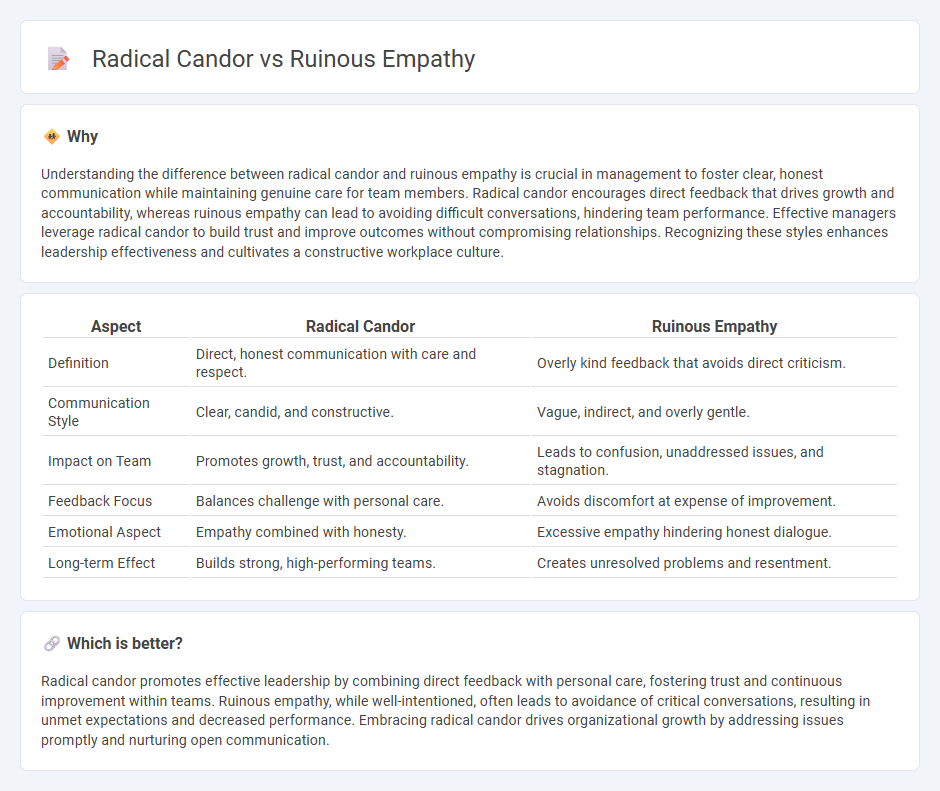
Radical candor involves providing honest, direct feedback while maintaining genuine care for the individual's growth, fostering trust and higher performance. Ruinous empathy, by contrast, prioritizes kindness over honesty, often resulting in unclear communication and missed opportunities for improvement. Explore how mastering the balance between these approaches can transform your leadership effectiveness.
Why it is important
Understanding the difference between radical candor and ruinous empathy is crucial in management to foster clear, honest communication while maintaining genuine care for team members. Radical candor encourages direct feedback that drives growth and accountability, whereas ruinous empathy can lead to avoiding difficult conversations, hindering team performance. Effective managers leverage radical candor to build trust and improve outcomes without compromising relationships. Recognizing these styles enhances leadership effectiveness and cultivates a constructive workplace culture.
Comparison Table
| Aspect | Radical Candor | Ruinous Empathy |
|---|---|---|
| Definition | Direct, honest communication with care and respect. | Overly kind feedback that avoids direct criticism. |
| Communication Style | Clear, candid, and constructive. | Vague, indirect, and overly gentle. |
| Impact on Team | Promotes growth, trust, and accountability. | Leads to confusion, unaddressed issues, and stagnation. |
| Feedback Focus | Balances challenge with personal care. | Avoids discomfort at expense of improvement. |
| Emotional Aspect | Empathy combined with honesty. | Excessive empathy hindering honest dialogue. |
| Long-term Effect | Builds strong, high-performing teams. | Creates unresolved problems and resentment. |
Which is better?
Radical candor promotes effective leadership by combining direct feedback with personal care, fostering trust and continuous improvement within teams. Ruinous empathy, while well-intentioned, often leads to avoidance of critical conversations, resulting in unmet expectations and decreased performance. Embracing radical candor drives organizational growth by addressing issues promptly and nurturing open communication.
Connection
Radical candor and ruinous empathy both influence leadership communication, with radical candor promoting direct, honest feedback that drives growth, while ruinous empathy involves excessive kindness that hinders accountability. Effective management requires balancing these approaches to foster trust without sacrificing performance or morale. Leaders who master this balance enhance team productivity and create a supportive work environment.
Key Terms
Feedback
Ruinous empathy occurs when feedback is overly softened to avoid hurting feelings, leading to a lack of honesty and missed opportunities for growth. Radical candor balances direct, clear feedback with genuine care, fostering trust and encouraging improvement. Discover how mastering this feedback approach can transform workplace communication.
Emotional Intelligence
Ruinous empathy occurs when excessive compassion leads to withholding constructive criticism, undermining team performance and personal growth. Radical candor balances caring personally with challenging directly, fostering an environment where emotional intelligence drives honest, respectful communication. Explore how mastering this balance enhances leadership effectiveness and team dynamics.
Challenging Directly
Ruinous empathy occurs when a leader prioritizes kindness over honesty, avoiding direct feedback to prevent hurting feelings, which ultimately harms growth and performance. Radical candor emphasizes challenging directly with clarity and care, balancing honest criticism with genuine concern to foster improvement and trust. Explore practical strategies to master challenging directly through radical candor for more effective leadership.
Source and External Links
Ruinous Empathy Quadrant - What Is It, Examples & More - Ruinous empathy occurs when, to avoid causing discomfort, individuals refrain from giving honest feedback, ultimately hindering personal growth and organizational success despite good intentions.
Implementing Radical Candour Avoiding Ruinous Empathy - Ruinous empathy stems from leaders avoiding tough feedback to protect feelings, which can foster mediocrity, miss growth opportunities, and allow unresolved issues to escalate.
Radical Candor - Ruinous empathy is the common mistake of sugarcoating or withholding feedback out of concern for others' feelings, leading to unclear expectations and stalled development.
 dowidth.com
dowidth.com